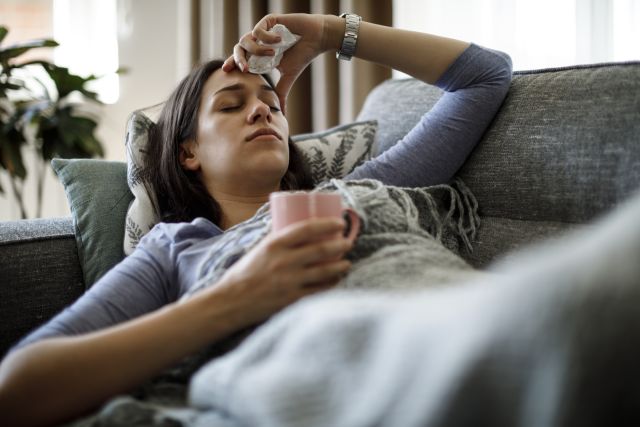Updated on September 26, 2024.
During the fall and winter months, people tend to spend more time inside. When there are more people indoors and the doors and windows are closed, it's easier for germs to spread.
“We typically get an uptick of patients in the fall, especially people with chronic lung diseases,” says Joshua Ezell, DO, an internal medicine practitioner in Overland Park, Kansas.
Why you’re more likely to get sick in the fall
There are two main reasons more people get sick in the fall, says Dr. Ezell. First, many of these bacteria and viruses are contagious and easily passed from person to person.
“When the weather starts getting cold, people spend more time indoors,” he says. "Closer quarters means it’s easier for germs to spread."
Second, some of these bugs, like the viruses that cause the flu and the common cold, thrive in lower temperatures.
“As the weather cools off, you have better conditions for bacteria and viruses to grow and replicate,” Ezell adds.
6 infections that are more common in the colder months
As the days get shorter and the weather gets colder, certain illnesses rear their heads more frequently. it’s a good idea to be mindful of the following:
Influenza
One of the most common—and most dangerous—is influenza, also known as the flu. The flu is a virus that put 360,000 Americans in the hospital during the 2022-2023 season. Although flu season peaks in the winter, it begins to ramp up in October.
It’s commonly spread when you touch your eyes, nose, and mouth with hands that have flu virus on them. It can also spread through the air as sick people breathe. People can spread the flu a day before symptoms develop, and they’re most contagious in the first three to four days after they get sick, but they can continue to transmit up to seven days after getting sick.
“The best way to prevent the flu is to vaccinate,” says Ezell. The Centers for Disease Control and Prevention (CDC) recommends you get your flu shot before Halloween. That will give your body enough time to develop protection against the virus before flu season really kicks in. But it’s never too late in the season to get a flu shot because the flu can stretch all the way into May. If you miss the optimal window, don’t put it off any longer. Nearly everyone aged 6 months and older is eligible.
COVID-19
More than 75,000 people in the U.S. died of COVID in 2023, according to provisional data from the CDC. While that’s a big drop from the 245,614 COVID deaths in 2022, the virus remains a significant threat, especially to people at higher risk of severe illness.
Unlike the flu, there isn’t a formally established seasonal pattern with COVID. But, like other respiratory viruses that spread through droplets in the air, COVID is more likely to be passed around when people are indoors, especially when the windows and doors are closed and there’s little circulation.
As with the flu vaccine, getting the COVID vaccine is the best way to protect yourself from severe illness. You may still be infected if you’re immunized, but you will be far less likely to become seriously ill, hospitalized, or die. It also reduces the risk of developing Long COVID. The CDC recommends that everyone ages 6 months and older receive the latest COVID vaccines.
The common cold
These infections are not as dangerous as COVID or the flu. But the common cold can still make you feel sick for a few days. Cold season starts in September and lasts through the winter.
Most often caused by rhinoviruses (and also a few types of coronavirus), there’s no vaccine for the common cold. But you can reduce your risk of either picking it up or spreading it to others by being diligent about washing your hands for 20 seconds with soap and water. Protect yourself further by staying away from people who are sick. Like COVID and flu, colds spread through the air.
Viral meningitis
This infection of the brain and spinal cord’s protective covering is most commonly reported in late summer and early fall. Headache, stiff neck, fever, fatigue, and sensitivity to light are common symptoms.
Avoid this germ by washing your hands frequently with soap and water for 20 seconds and not touching your face with unwashed hands. Cleaning and disinfecting high-touch surfaces, like fridge handles or doorknobs, may also help. And try to avoid mosquito bites, which can spread some forms of viral meningitis.
Bacterial meningitis
Also associated with large groups of people living together, like in college dorms, bacterial meningitis is a potentially deadly emergency. The symptoms are similar to viral meningitis, but more severe. Stiff neck and altered mental function are especially dangerous signs.
Vaccination is the most effective prevention, but handwashing for 20 seconds with soap and water is important. It is also important to avoid close contact with people who are sick. Coughing, sneezing, kissing, and sharing items like lipstick, utensils, or cigarettes can spread meningitis germs.
Norovirus
Norovirus causes diarrhea, vomiting, stomach pain, fever, and aches. It spreads through close contact and contaminated surfaces and is very contagious. “It’s another condition commonly associated with close quarters, like with kids going back to school,” says Ezell.
You can reduce your risk through meticulous handwashing and through surface decontamination, as well as by washing your fruits and vegetables thoroughly before eating. Avoid foods prepared by someone who is sick.
Stay healthy this fall
Staying healthy is pretty simple, says Ezell.
“Just remember the basics,” he says. “You should be cognizant of washing your hands and covering your mouth if you cough or sneeze.”
More basics:
- Stay away from people who are sick, and if you’re sick, stay home to avoid infecting others.
- Try to always cover your sneezes and coughs with a tissue or shirt sleeve—not the palm of your hand.
- Get plenty of rest.
- Keep your stress under control.
- Drink plenty of fluids.
- Eat healthy foods if you come down with the flu or a cold.
And, get your flu shots. Each year’s shot is designed to protect against the strains of viruses experts think will be most common, and it can reduce your risk of getting the flu by 40 to 60 percent. If you do get the flu after being vaccinated, it will likely be a milder case. You can get the flu shot at the same time as a coronavirus vaccine (or booster) if you haven’t gotten the latter yet.
Good hygiene and other healthy habits will not only lower your risk of these conditions, but could help those around you stay well, too.







